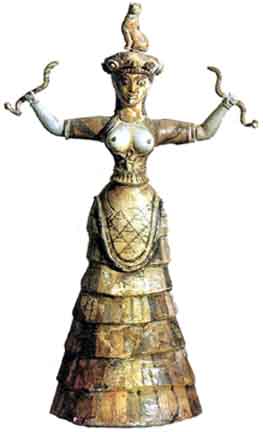The subject of this post surfaced during my most recent visit to Crete at the end of last month. As a Greek-American of Cretan heritage, who has been actively engaged in the process of reconnecting with my roots, I found the standing and role of women in Greek culture and society, both in their religious and secular senses, to be a very meaningful topic; one that deserves serious attention. And I would even go so far as to suggest that it is time to rediscover what has been called the "Lost Feminine" in so-called modern civilization by looking deeply into the ancient, and uniquely Greek-Cretan, past through a meaning-centered lens.
In this connection, I'm referring explicitly to the Minoan civilization, a culture that arose and flourished on the island of Crete from approximately 3650 to 1450 BC. This Bronze Age civilization was later destroyed by natural and man-made forces that are still under debate, and its remains, for better or worse, were replaced or dominated by Mycenaean Greek culture. Rediscovered at the beginning of the 20th Century, most notably through the work of the British archaeologist, Sir Arthur Evans, Minoan Crete took its historic place, as Will Durant said in 1939, as "the first link in the European chain."
It's hard to imagine anyone who has visited Crete who doesn't know about or who hasn't visited Knossos (Κνωσóς), the archaeological site deemed to be the epicenter of the Minoan civilization and culture. And is there anyone who does not believe that the Palace at Knossos is the source of the myth of the Labyrinth, an elaborate maze-like structure constructed for King Minos of Crete and designed by the legendary artificer Daedalus to hold the Minotaur, a half-man/half-bull creature that was eventually killed by the Athenian hero, Theseus?
However, this is not the part of Minoan (pre)history or mythology that served as a catalyst for this particular post. Nor is it the cultural attribute that best describes the centerpiece influence of women on all aspects of life and living at the time the Minoan civilization flourished. In his well-researched book, In Search of the Lost Feminine: Decoding the Myths that Radically Reshaped Civilization, Craig Barnes, who also happens to live in my hometown of Santa Fe, New Mexico, USA, challenges the inevitability of our commonly-held notion of patriarchy by examining the mystery of the Minoan civilization, traces the collapse of the Minoan world, and describes the emergence of the "warrior" civilization and its implications for surviving in the "postmodern" era.
According to Barnes, the story of Western civilization has been told for some thirty-five hundred years with a "political slant" that worked for the cause of the victors of the Trojan War. This particular story, he argues, effectively shortchanged human nature and disparaged our deepest instincts toward peace-making and reconciliation, as well as toward nurturing and the cycles of the season. In contrast to the uncivil forces (i.e., the suppression of "civil" in civilization) and oftentimes brutal results of patriarchy, Barnes underscores that the alternative values glorified by the Minoan civilization, what he refers to as the "inner feminine" aspect of human nature, have always provided a light of hope into the patriarchal world and illuminated, as well as elevated, the human spirit across the ages and especially throughout Western history.
The foundations of Western civilization, moreover, can be found in the myths, ancient stories, artifacts, and encoded messages left after the decline and subsequent disappearance of Minoan culture. Indeed, over the last one hundred years a great deal of new information about the Minoans and their way of life has been unearthed (both literally and figuratively). As a result, we now know that the status of women was vastly different before the emergence of patriarchy and the mythical storytelling that was used to support, rationalize, and justify its dominance as the guiding paradigm for "civilization." Women in the Minoan era were portrayed as benign rather than dangerous, the latter being a presumed characteristic that has plagued humankind to the present day. Moreover, in what has been called a women-centered, egalitarian, and peaceful society, the "ancient" Minoans, as further proof of their matriarchal mindset, were also conscious of a need to worship the goddess within (or feminine mystique), along with the goddesses who symbolized a very different cultural orientation than, rightly or wrongly, we hold in the contemporary era.

And, remember, this societal and cultural view manifested itself well before--literally several millennia before--the feminist "movement" surfaced in the USA and abroad. Just think for a moment, by way of example, how far it pre-dates feminist author and activist Gloria Steinem, who became a leader of the women's rights movement throughout the 1960s and 1970s AD! Whatever your political, social, religious, faith-based, or cultural persuasion, and whether or not you agree with Mr. Barnes's assessment of the Minoan worldview and how it effectively challenges the inevitability of patriarchy, you have to wonder (at least I do) what human history would have looked like if the "feminine" as espoused by Minoan culture had not been lost. One giant step forward, how many steps backward?
***
You can find out more about Dr. Alex Pattakos, author of the international bestselling book, Prisoners of Our Thoughts, in his HuffPost Bio and at http://www.prisonersofourthoughts.com. See also his "Dr. Meaning" Channel on YouTube: http://www.youtube.com/DrMeaning and follow him on Twitter: http://www.twitter.com/DrMeaning . You can contact Alex, who is working on a new book on living a meaningful life inspired by Greek culture, at: alex@prisonersofourthoughts.com.